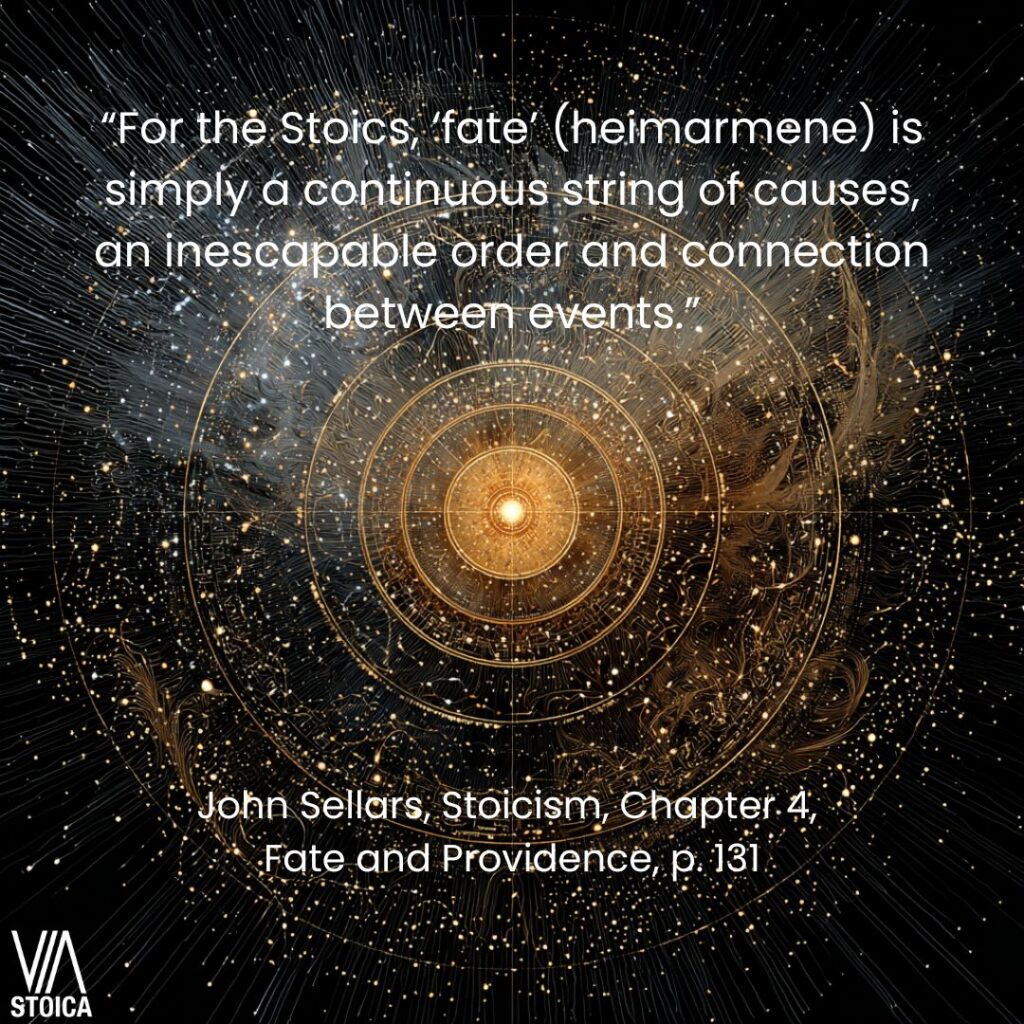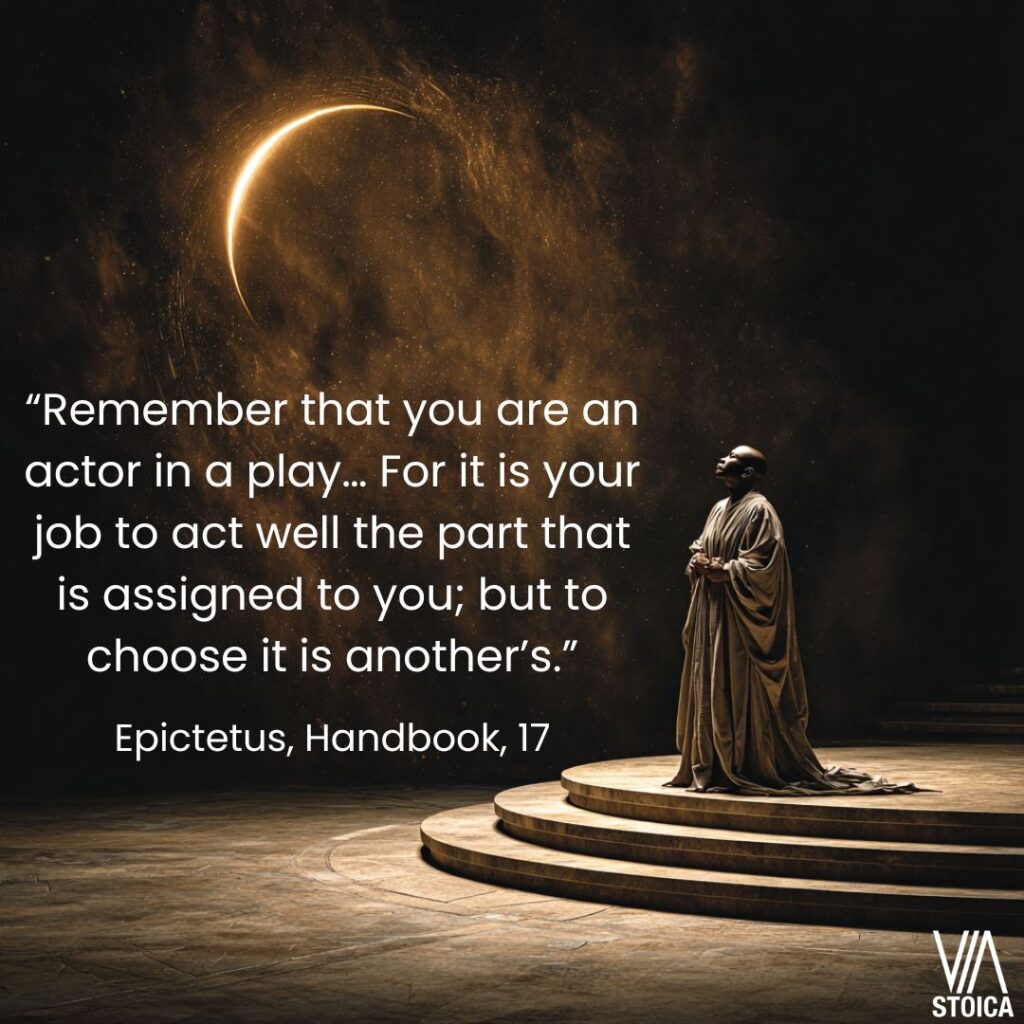What Does It Mean to Love Your Fate?

To practice Amor Fati means to love one’s fate, not just to accept it, but to embrace and love it. To affirm everything that happens as necessary and good for the whole. The phrase, meaning “love of fate,” comes from Friedrich Nietzsche, who described it as the mark of true greatness:
“My formula for human greatness is amor fati: not wanting anything to be different, not forwards, not backwards, not for all eternity. Not just enduring what is necessary, still less concealing it – all idealism is hypocrisy in the face of what is necessary – but loving it…”
Friedrich Nietzsche, Ecce Homo: How to Become What You Are, Chapter 1.10
Nietzsche’s call to love existence echoes an older Stoic teaching. The Stoics believed that happiness comes not from shaping events to our will, but from aligning our will with the events that unfold.
Pierre Hadot notes that Nietzsche’s phrase perfectly captures what Marcus Aurelius practiced through the Discipline of Desire, the training of our wants so that they align entirely with nature’s course:
“The phrase is Nietzsche’s, and my intention in alluding to the love of Destiny of which Nietzsche speaks is to help us better to understand, by means of analogies and contrasts, the spiritual attitude which, in Marcus Aurelius, corresponds to the discipline of desire.”
Pierre Hadot, The Inner Citadel, Chapter 7, Amor Fati, p. 214
Amor Fati is the moment when desire and reality no longer conflict. To love your fate is to live in harmony with reason, seeing every event as an expression of the universe’s order.
Philosophical Grounding – Fate, Freedom, and Providence
For the Stoics, fate is not a chain that imprisons us, but a web that connects us to everything else. It is both Providence and order, the continuous unfolding of divine reason (Logos) throughout the cosmos.
Pierre Hadot explains:
“For the Stoics, the ideas of Providence and Destiny, together with the concepts of the complete interpenetration of all the parts of the world, and of the loving accord between the Whole and all its parts, were enough to justify that attitude of loving acceptance in the face of all that comes from Nature which constitutes the discipline of desire.”
Pierre Hadot, The Inner Citadel, Chapter 7, Amor Fati, p. 216)

John Sellars describes this order simply:
“For the Stoics, ‘fate’ (heimarmene) is simply a continuous string of causes, an inescapable order and connection between events.”
John Sellars, Stoicism, Chapter 4, Fate and Providence, p. 131
Nothing happens without cause, and our choices are part of that same order. We are co-fated, our actions, though voluntary, belong within the whole chain of causes. Freedom is not found in escaping fate but in acting well within it.
Living in Accord with Nature
To love fate is to see the world as a single living system. Marcus Aurelius teaches that every event is woven into the same thread of reason:
“The things ordained for you – teach yourself to be at one with those. And the people who share them with you – treat them with love. With real love.”
Marcus Aurelius, Meditations, Book 6.39
“He does only what is his to do, and considers constantly what the world has in store for him – doing his best, and trusting that all is for the best. For we carry our fate with us – and it carries us.”
Marcus Aurelius, Meditations, Book 3.4
“To welcome with affection what is sent by fate.”
Marcus Aurelius, Meditations, Book 3.16
This is not resignation, but a joyful cooperation with the whole. What happens to us is part of what happens to the world, and if we are one with the world, then we can meet each moment with love.
Acting Your Role Well
Epictetus uses the metaphor of a play to illustrate this relationship between fate and freedom:
“Remember that you are an actor in a play, which is as the author wants it to be; short, if he wants it to be short; long if he wants it to be long. If he wants you to act a poor man, a cripple, a public official, or a private person, see that you act it with skill. For it is your job to act well the part that is assigned to you; but to choose it is another’s.”
Epictetus, Handbook, 17
Our role is not ours to choose, only how we play it. The Stoic life is a performance of virtue within necessity. Fate sets the stage; we determine the quality of the performance.
This is the heart of Stoic freedom: to act justly, wisely, and courageously, even when the script is not of our making.
The Self and the Whole

Hadot describes the Stoic transformation of perspective:
“The self as guiding principle coincides with the guiding principle of the universe.”
Pierre Hadot, The Inner Citadel, Chapter 7, Amor Fati, p. 217
“If, then, the self’s awareness is accompanied by a consent to events, it does not become isolated, like some tiny island, in the universe. On the contrary: it is opened up to the whole of cosmic becoming, to the extent that the self elevates itself from its limited situation and partial, restricted individual viewpoint, toward a universal perspective.”
Pierre Hadot, The Inner Citadel, Chapter 7, Amor Fati, p. 217
In this widening of consciousness, the individual ceases to fight against reality and instead participates in it. This is the Stoic meaning of freedom: to act as part of the whole rather than apart from it.
Hadot continues:
“Whereas a dance or the reading of a poem reach their goal only when they are finished, moral activity reaches its goal in the very instant when it is accomplished. It is therefore entirely contained within the present moment.”
Pierre Hadot, The Inner Citadel, Chapter 7, Amor Fati, p. 219
Every act of willing acceptance is complete in itself. To love fate now is to fulfill the purpose of life in this very moment.
Joyful Acceptance and Gratitude
Donald Robertson explains how this love of fate manifests as a joyful and reverent attitude toward life:
“The wise man loves life and is grateful for the opportunities it gives him, but he accepts that everything changes and nothing lasts forever. Marcus Aurelius therefore wrote that is a characteristic of the Stoic sage ‘to love and welcome all that happens to him and is spun for him as his fate.’”
Donald Robertson, How To Think Like a Roman Emperor, Chapter 4, p. 133
He adds:
“The concept of amor fati encapsulates the Stoic attitude of acceptance fundamental to the discipline of desire. The Sage has a sense of natural ‘piety’ or reverence towards the universe as a whole and, although he does what he judges appropriate in any given situation, sometimes requiring great courage or self-discipline, he nevertheless accepts the outcome with complete equanimity.”
Donald Robertson, Stoicism and the Art of Happiness, Chapter 4, p. 89
Gratitude is the emotional signature of Amor Fati. It is not a grim endurance but an inner “yes” to life. The Stoic loves life because she understands it, because she sees the reason that sustains it all.

Practical Exercises
1. Act Your Role Well
“Remember that you are an actor in a play… For it is your job to act well the part that is assigned to you; but to choose it is another’s.”
Epictetus, Handbook, 17
Practice: Begin each morning by reminding yourself that you don’t control the script of life, only your performance. Ask, “What role is mine to play today?” Then perform it with excellence and calm.
2. Welcome Each Thread of Fate
“The things ordained for you – teach yourself to be at one with those.”
Marcus Aurelius, Meditations, Book 6.39
Practice: When events do not go as planned, pause and repeat: This too belongs to the whole. Feel the resistance lessen. Accept the moment not as an obstacle, but as part of the same pattern that gives life its order.
3. See from Above
“If, then, the self’s awareness is accompanied by a consent to events … it is opened up to the whole of cosmic becoming.”
Pierre Hadot, The Inner Citadel, Chapter 7, Amor Fati, p. 217
Practice: Close your eyes and visualize yourself rising above the earth. See people, cities, and movements as parts of one living organism. Hold this vision of unity for a few minutes, then return to your day with renewed perspective.
Final Reflection
“The self as guiding principle coincides with the guiding principle of the universe.”
Pierre Hadot, The Inner Citadel, Chapter 7, Amor Fati, p. 217
To love one’s fate is to live in harmony with that truth. Amor Fati transforms resignation into joy and transforms acceptance into gratitude.
As Marcus Aurelius reminds us through Robertson’s words:
“The wise man loves life and is grateful for the opportunities it gives him, but he accepts that everything changes and nothing lasts forever. Marcus Aurelius therefore wrote that it is a characteristic of the Stoic sage ‘to love and welcome all that happens to him and is spun for him as his fate.’”
Donald Robertson, How To Think Like a Roman Emperor, Chapter 4, How to Conquer Desire, p. 133
Freedom, for the Stoic, is not to escape the chain of causes but to align oneself joyfully with it, to say yes to life as it is, and to see every moment as belonging.
FAQ – Practicing Amor Fati
1. Is Amor Fati just resignation?
No. Stoics do not withdraw from life; they act with virtue and love the results, whatever they may be.
2. Can I still feel pain or sadness?
Yes. The Stoics never deny emotion, only false judgments. You can feel pain and still love the order that allows it.
3. How can I begin practicing Amor Fati?
Start with reflection: each night, write down one thing you resisted. Ask, “What if this, too, belongs?”
4. Does this mean everything is good?
For the Stoics, yes, everything that happens is good for the Whole. Our task is to live well within it.
Want to explore more Stoic practices?
Book a free consultation with one of our Stoic Coaches to get support. Or read more about How to Practice Stoicism here. Listen to the Via Stoica Podcast on Spotify, Apple Podcasts, or YouTube.
Author Bio
Benny Voncken is the co-founder of Via Stoica, where he helps people apply Stoic philosophy to modern life. He is a Stoic coach, writer, and podcast host of The Via Stoica Podcast. With almost a decade of teaching experience and daily Stoic practice, Benny creates resources, workshops, and reflections that make ancient wisdom practical today.



0 Comments